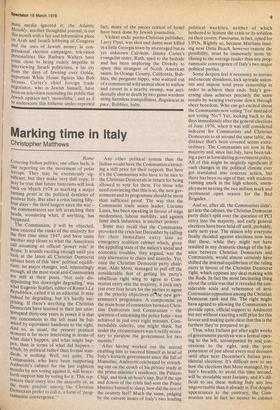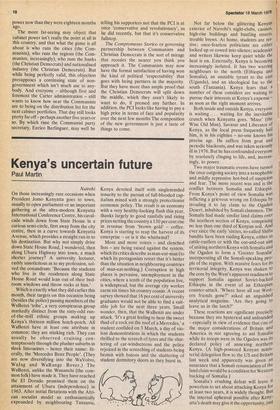Marking time in Italy
Christopher Matthews
Rome Covering Italian politics, one often feels, is !Ike reporting on the movement of polar icecaps. They may be enormously significant, but they make very dull copy. It may be true that future historians will look back on March 1978 as marking a major turning point in the political destinies of Postwar Italy. But after a crisis lasting fiftyfour days — the third longest since the war — the commentators are left scratching their heads, wondering what, if anything, has happened.
The Communists, it will be objected, have entered the ranks of the majority for the first time since 1947, and have come another step closer to what the Americans call assuming an official 'power role' in Rome. It sounds exciting enough until you look at the latest all Christian Democrat cabinet born of this 'new' political equilibrium: no major changes, and, interestingly enough, all the most vocal anti-Communists are still at their posts. 'Not only disappointing but downright degrading,' was What Eugenio Scalfari, editor of Rome's La R. epubblica, called it in an editorial. It may Indeed be degrading, but it's hardly surprising. If there's anything the Christian Democrats have learned in their last uninterrupted thirty-one years in power it is that any concessions to the left must be balanced by equivalent handouts to the right. And so, as usual, the present political moment is far more interesting in terms of What didn't happen, and what might hapPen, than in terms of what did happen — Which, by political rather than formal standards, is nothing. Well, not quite. The Communists, who have been supporting Andreotti's cabinet for the last eighteen months by not voting against it, will henceforth support him by voting for it. This represents their entry into the majority or as the more prudish among the Christian Democrats prefer to call it, a form of 'programmatic convergence.'
Any other political system than the Italian would have the Communists extracting a stiff price for their support. But here it's the Communists who have to be nice to the Christian Democrats in return for being allowed to vote for them. For those who need convincing that this is so, the new government and its programme should be more than sufficient proof. The way that the Communist trade union leader, Luciano Lama, has been speaking in favour of wage moderation, labour mobility, and against lame duck industries, is another pointer.
Some may recall that the Communists provoked the crisis last December by calling for their immediate entry into an emergency coalition cabinet which, given the appalling state of the nation's social and economic troubles, they argued, was the only alternative to chaos and anarchy. Yet, once the Christian Democrat party chairman, Aldo Moro, managed to pull off the considerable feat of getting his party's rebellious right wing to agree to Communist entry into the majority, it took only just over four hours for the parties to agree on the priority objectives ofathe new government's programme. A compromise on the main bone of contention between Christian Democrats and Communists — the question of unionising the police force —was achieved in just over eight minutes. Commendable celerity, one might think, but under the circumstances was it really necessary to Paralyse the government for two months?
After having worked out the accord enabling him to succeed himself as head of Italy's fortieth government since the fall of Mussolini, Andreotti celebrated by stretching out on the couch of his private study at the prime minister's residence, the Palazzo Chigi, and took an hour's nap. But if the ups and downs of the crisis had sent the Prime Minister himself to sleep, how did the rest of the country feel? Much the same, judging by the current issues of Italy's two leading political weeklies, neither of which bothered to feature the crisis or its solution on their covers. Panorama, in fact, opted for UFOs. Rightly so, because Martians landing near Ostia Beach, however remote the possibility, must be immensely more tittilating to the average reader than any programmatic convergence of Italy's two major political parties.
Some despots feel it necessary to torture and execute dissidents, lock up trade unionists and impose total press censorship in order to achieve their ends. Italy's governing class achieves precisely the same results by wearing .everyone down through sheer boredom. Who can get excited about the Communists now voting 'Yes' instead of not voting 'No'? Yet, looking back to the days immediately after the general elections of June 1976, when it was still considered indecent for Communists and Christian Democrats to sit around the same table, the distance that's been covered seems extraordinary. The Communists are now in the majority and, since last July, have been taking a part in formulating government policy. All of this might be mightily significant if such changes in the political climate ever got translated into concrete action, but there has been no sign of that, with students running amok in the high schools, unemployment nearing the two million mark and permanent open season for the Red Brigades.
And so, after all, the Communists didn't get into the cabinet, the Christian Democrat party didn't split over the question of PCI entry into the majority, and early general elections have been held off until, probably, early next year. The reason why everyone finally decided against elections now was that these, while they might not have resulted in any dramatic change of the bal ance between Christian Democrats and Communists, would almost certainly have shifted the internal equilibrium of the ruling party in favour of the Christian Democrat right, which opposes any deal-making with the Reds. In fact the most fascinating thing about the crisis was that it revealed the considerable scale and vehemence of antiCommunist opposition among the Christian Democrat rank and file. The right might have agreed to allowing the Communists to provide open, official support to Andreotti but not without exacting a stiff price for this favour and making quite clear that this is the furthest they're prepared to go.
Thus, what Italians got after eight weeks of government paralysis was a formal opening to the left, accompanied by real concessions to the right, and the postponement of just about every real decision until after next December's Italian presidential electiong. It's difficult now to see how the elections that Moro managed, by a hair's breadth, to avoid this time around, will be avoidable next January, and it's difficult to see these making Italy any less ungovernable than it already is. For despite appearances to the contrary, the Communists are in fact no nearer to cabinet power now than they were eighteen months ago.
The more far-seeing may object that Cabinet power isn't really the point at all in this country, and that what the game is all about is who runs the cities (the Communists), who runs the regions (the Communists, increasingly), who runs the banks (the Christian Democrats) and nationalised industry (the Christian Democrats). But while being perfectly valid, this objection presupposes a continuing state of nongovernment which isn't much use to anybody. And everyone although first and foremost the Carter administration still wants to know how near the Communists are to being on the distribution list for the next cabinet portfolios. That day still looks pretty far offperhaps another five years or so. By which time the Communist party secretary, Enrico Berlinguer, may well be telling his supporters not that the PCI is at once 'conservative and revolutionary', as he did recently, but that it's conservative fullstop.
The Corn promesso Storico or governing partnership between Communists and Christian Democrats is the sort of mirage that recedes the nearer you think you approach it. The Communists may now have the formal satisfaction of having won the kind of political 'respectability' that goes with being partners in the majority. But they have more than ample proof that the Christian Democrats will split down the middle, which they aren't likely to want to do, if pressed any further. In addition, the PCI looks like having to pay a high price in terms of face and popularity over the next few months The composition of the new government is just a taste of things to come.



































 Previous page
Previous page